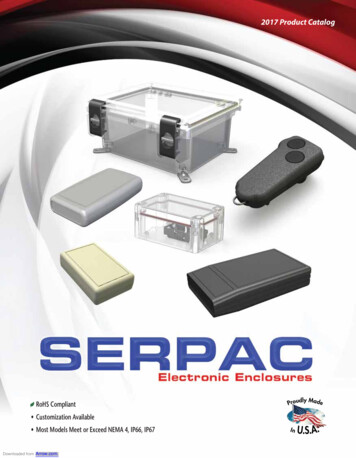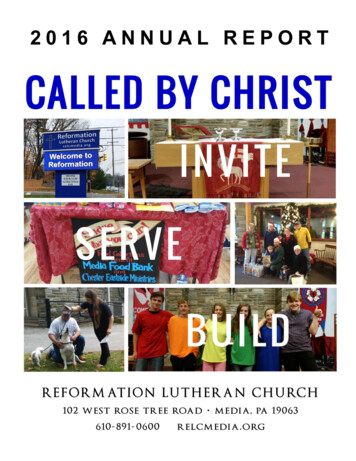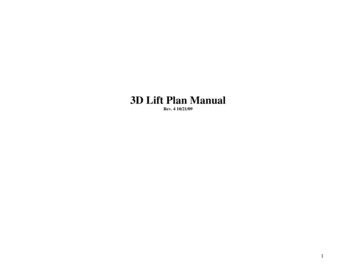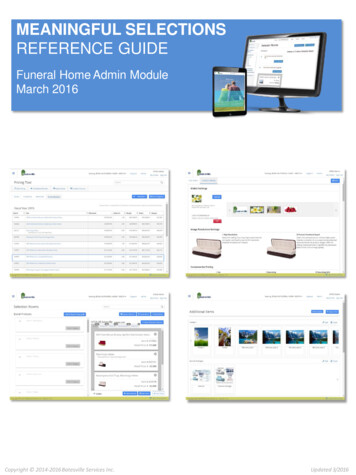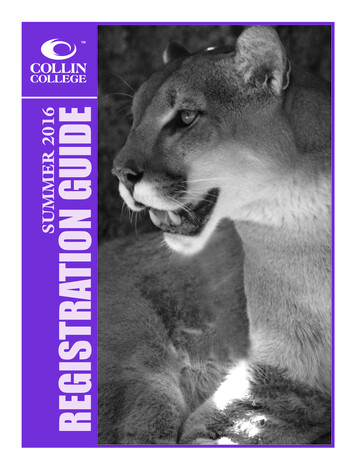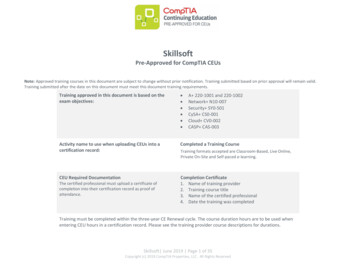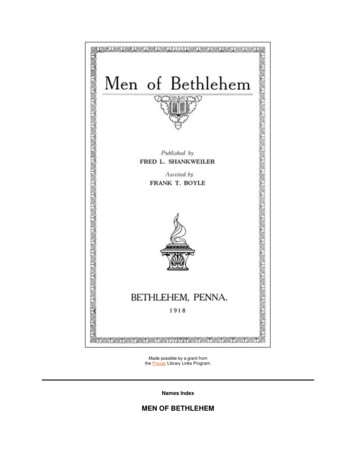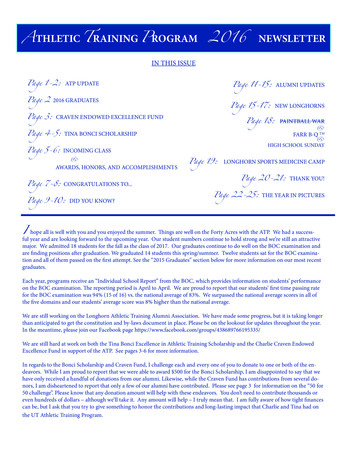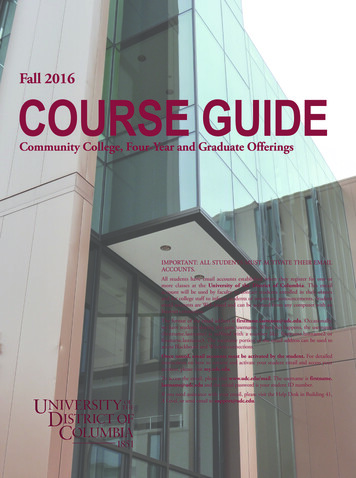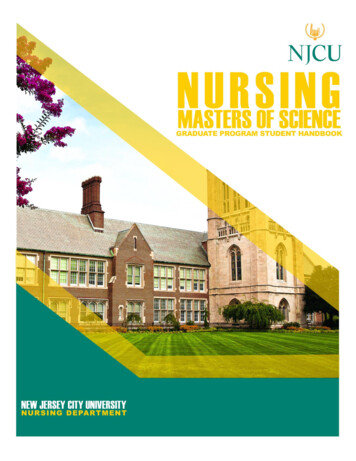
Transcription
Approved, 6 2016Page 2
Approved, 6 2016Page 3
WELCOME LETTER: CHAIR, NURSING DEPARTMENTOn behalf of the faculty of the Nursing Department, welcome to the Masters of Science in Nursingprogram at New Jersey City University. You are embarking on the challenge and opportunity of alifetime. Nursing with an advanced degree provides a multitude of opportunities — moving beyondbasic nursing practice.the opportunities are endless. You will be learning from a student-centered,highly qualified faculty focused on your future success. The choice to make a difference is yours and weappreciate you choosing New Jersey City University to assist you in reaching your professionaldevelopment goals.The Masters of Science in Nursing degree is a critical step in advancing your career in professionalnursing. The American Association of Colleges of Nursing, American Organization of Nurse Executives,American Nurses Association, as well as the ANCC Magnet Recognition Program recognize this degree asthe minimum educational requirement for advanced nursing practice. The Institute of Medicine’sFuture of Nursing report recognized that strong nursing leadership is critical if the vision of atransformed health care system is to be realized.Given the demands of today’s ever changing healthcare delivery system, advanced practice nurses useevidence-based best practices to inform practice decisions and improve outcomes for recipients ofnursing care. This translation of evidence into practice is accomplished through the leadership ofadvanced practice nurses in establishing and leading interdisciplinary teams and designing innovativenursing care delivery systems.Welcome to New Jersey City University.welcome to your future!Kevin O’NeillKevin O’Neill, DNP, RN, NEA-BC, CNE, CPHIMSChair and Associate Professor, NursingApproved, 6 2016Page 4
GRADUATE PROGRAM HANDBOOK STATEMENTThis Graduate Handbook for Nursing is in conjunction with the Graduate Studies/Graduate catalog, NewJersey City University (NJCU). Students are responsible for acting in accordance with the University andNursing Department policies addressed in these handbooks. Specific criterion and policies, affecting theGraduate Program of Study in Nursing are contained and described below. For additional informationfor the NJCU Graduate Program, please visit the following website: www.njcugrad.infoNURSING DEPARTMENT CONTACT INFORMATIONNew Jersey City University, Nursing Department has two learning locations:Jersey City CampusNew Jersey City University2039 Kennedy BlvdRossey 405Jersey City, NJ 07305201-200-3157Wall LocationNJCU @ Wall800 Monmouth BlvdRoom 128Wall, NJ 07719732-280-7090Faculty Listing and Contact ESDr. Kevin O’Neill, RN, Chair and Associate Certified Nurse EducatorDNPProfessorNursing AdministrationCertified Professional inHealth Information &Management SystemsScardaville, Debra, Associate Professor Certified Pediatric NurseRN, PhD, CPNP-PCGraduate Program Practitioner: Primary CareCoordinatorBlozen, Barbara, RN, Associate Professor Clinical Nurse LeaderEdD, CNLProfessional DevelopmentBoseman, Gloria, RN, ProfessorCommunity HealthPhDBranchizio, Denise, Assistant ProfessorAdult HealthRN, MSN, DNP(c)Fortier, Mary, RN, Associate Professor Clinical Nurse LeaderEdD, CNLGaletz, Elizabeth, RN, Assistant ProfessorAdult HealthMSNApproved, 6 2016TITLEPage 5
FACULTYTITLEJoffe, Patricia, RN,PhD, APRN-BC, CNSJohnson,Shanda,RN, PhD, FNPNash, Denise, RN,MSNRuggiero,Jeanne,RN, PhD, CNEWright, Joyce, RN,PhD, CNLProfessorAssistant ProfessorAssistant ProfessorAssistant ProfessorAssociate l Nurse SpecialistPediatricsCertified Family NursePractitionerAdult HealthAdult HealthCertified Nurse EducatorCertified Nurse EducatorClinical Nurse LeaderHISTORY OF NURSING PROGRAM NJCUThe Nursing Department is part of the College of Professional Studies of New Jersey City University. TheDepartment began in 1974 when it received provisional approval from the New Jersey Board of HigherEducation and the New Jersey Board of Nursing to implement a program offering a Bachelor of Sciencein Nursing degree to Registered Nurses. Two faculty members were hired in 1975 and the programbecame operational in Fall 1976. In March 1977, the New Jersey Board of Nursing granted full approvalto the program. The National League for Nursing awarded initial accreditation in April 1979 and hasbeen accredited since that time. In 2009, the department was re-accredited for a period of eight years.The Nursing Department demonstrated it responsiveness to the needs of the community in developingthe academic program leading to the award of a Bachelor of Science degree in Nursing (BSN) forregistered nurses. The RN completion track remains operational and is designed to provide registeredstudents a broad base in general education derived from the arts and sciences, then adding nursingknowledge and skills appropriate to baccalaureate nursing. The BSN program facilitates the preparationof a generalist in professional nursing practice and is the basis for graduate study and continuingeducation in nursing. The primary goal of the Nursing Department is to prepare a generalist registerednurse who possesses the unique knowledge and skills to work in the integrated health care deliverysystems that have come to characterize urban areas and to manage patients with the complex healthproblems that face New Jersey’s underserved, culturally diverse population. Since its inception, the RNto BSN track has provided opportunity for nearly 2000 registered nurses to obtain bachelor’s degrees, toexpand their knowledge and skill levels, and to prepare themselves for graduate education.In 2007, the Department expanded its BSN program with the addition of a generic, accelerated, seconddegree track (ABSN) for individuals holding a bachelor’s degree in another field. Through this initiative,the Nursing Department prepares registered nurses to address the current and worsening nursingshortage, particularly in the urban, inner-city local area served by the university. The implementation ofthe accelerated track allows individuals who hold a BA or BS to acquire the knowledge and skillsnecessary to become registered nurses. The program of study is incorporated into a framework of anintense 12-month program aimed at the preparation for professional nursing positions. The ABSN andRN-BSN programs are offered at two locations: the main campus in Jersey City, NJ and Wall, NJ incooperation with Brookdale Community College.Approved, 6 2016Page 6
HISTORY OF GRADUATE NURSING PROGRAM NJCUIn 1997, the Nursing Department received approval by the New Jersey President’s Council and NewJersey Department of Education to offer a Master of Science degree with a major in Nursing. Twoeducational tracks were offered: Urban Nursing and Holistic Nursing. The program became operationalin 1998 and graduated a total of 34 nurses during its time. These tracks were retired on 2007 due to achanging healthcare environment and increased emphasis on the Advance Practice Role rather thanthese specializations. A particular need for master’s prepared nursing faculty currently exists.OVERVIEW OF NURSING GRADUATE PROGRAMPurpose of Nursing Graduate ProgramThe purpose of the Graduate Program in Nursing is to prepare a diverse cadre of Masters’ educatednurses to meet the continued documented need for specialization and advanced practice nursingpreparation.NJCU MissionThe New Jersey City University mission is to provide a diverse population with an excellent universityeducation. The University is committed to the improvement of the educational, intellectual, cultural,socio-economic, and physical environment of the surrounding urban region and beyond.Nursing Department MissionThe mission of the Nursing Department is to educate students, advance the profession of nursingthrough scholarly activities, to provide care responsive to the health care needs of a diverse populationand prepare leaders to improve healthcare outcomes of those they serve.Nursing Department PhilosophyThe Nursing Department of New Jersey City University believes nursing is a professional, scientificdiscipline with academic and practice dimensions. The discipline has as its primary focus themaintenance and promotion of health achieved through collaboration with individuals, families, groups,and the community in a manner that is consistent with society’s expectations and needs. Professionalnursing practice has a solid base in liberal education and is further developed through the acquisition ofnursing knowledge, skills and attitudes. The profession of nursing builds its knowledge base through therigorous scientific inquiry of theory and practice that continues the process of theory development andprovides the foundation for evidence-based practice. The nursing process and evidence-based practiceestablish the foundation for sound clinical reasoning to allow complex independent judgments to bemade based on available data and knowledge. The Nursing Department faculty believes thebaccalaureate level to be the essential entry-level educational preparation for professional nursingpractice.Nursing Department Conceptual and Organizing FrameworkPatient: Person, Family, and/or CommunityApproved, 6 2016Page 7
The patient is the recipient of nursing care and includes the person, family, group, and/or community,each moving through its own unique developmental stages. The recipient of care may beconceptualized as holistic, encompassing personal, social, and physical dimensions.Patients are persons with unique lifestyles, knowledge, beliefs, values, needs, and goals who interactdynamically with their environment, respond to health issues in individualized ways, and are capable ofmaking critical choices. They have a right to participate collaboratively with nurses in decisions and haveshared accountability for outcomes.The family is a dynamic social system that attempts to meet the needs of its members. It is the primaryreference group of the individual and is in constant interaction with its environment. Individuals sharinga common purpose or problem are the group or aggregate patients of nursing.A community may also be a patient as it is comprised of individuals and groups. Professional nurses areable to identify and utilize resources within healthcare settings and the community to improve thehealth and well-being of patients.EnvironmentThe environment comprises both the internal and external contexts of the individual and involvesdynamic forces which affect the health status of the patient. The environment includes forces that arecultural, social, political, economic, and physical. The larger society is a network of relationships thatlink individuals in families and groups. Individuals, as open systems, are in constant interaction with theenvironment in a dynamic, mutual exchange. Professional nursing practice considers the impact of thesociopolitical, legal, ethical, and economic forces on person, families/groups, and communities.HealthHealth may be defined as the state of well-being at a given point in time for a patient/client. It is amultidimensional adaptive state within a constantly changing environment, characterized by wellness,illness, disease, or dysfunction. Health influences and is influenced by the patient’s development level.It is both objective and subjective and encompasses physical, psychosocial, and spiritual dimensions.Health is a relative state with parameters that may be defined differently by diverse cultures. Patientshave responsibility for their health status by virtue of their ability to make health choices. The role ofthe professional nurse is to foster health promotion activities, to facilitate adaptation to greater levels ofhealth, and to assist the patient in optimizing wellness.NursingNursing is a professional discipline that integrates theory and practice. The science of nursing is thegeneration and application of a body of theoretical knowledge to health care situations. Nursing care ispatient-centered and provided to patients in a wide range of health care settings with the goal ofassisting them to achieve maximal health through interventions derived from evidence-based practice.Nursing competencies are guided by professional standards and include psychomotor and interpersonalskills, collaboration, and leadership using the processes of clinical reasoning, problem solving, anddecision-making. Advocacy and caring are cornerstones of the role of the professional nurse who actson behalf of individuals, families, communities, and global populations.Approved, 6 2016Page 8
Nurses work autonomously within a defined scope of practice and collaboratively with members of thehealth team. Regulations and standards, such as those defined by state Boards of Nursing, the Scopeand Standards of Practice, and the Code of Ethics for Nurses guide nursing practice as nurses areaccountable to the public they serve.Scientific and technological advances and the increasing incorporation of nursing research into practicemandates involvement in lifelong learning and the incorporation of acquired knowledge into practice. Acommitment to continuous quality improvement, improved patient outcomes, enhanced patient safety,and active involvement with the profession itself are key elements in professional nursing.Education Philosophy: Nursing DepartmentThe faculty of the Nursing Department believe that teaching-learning is a continuous, reciprocal, varyingprocess according to individual differences among faculty, agency, and students. The development of aspirit of inquiry and sound clinical reasoning are crucial for the professional nurse. Facilitating studentmovement toward self-actualization is a basic responsibility of faculty in the teaching-learning processas students move toward becoming contributing and accountable members of the profession and ofsociety. Evaluation is a continual process which must be conducted systematically by faculty, students,and others involved in learning. Ongoing evaluation contributes to the promotion, maintenance, andrestoration of the health of the community of which the University and Department is part.Educational ProcessNursing Department faculty believes the goal of the educational process is fourfold: Help a highly diverse student body become liberally educated professionals Afford students an opportunity to explore and develop a personal philosophy of nursing andnursing education that is built upon a sound theoretical foundation and incorporates practiceelements into a seamless continuum of “embodied know-how” Achieve a balance between theory and practice to achieve fully dimensional learning Teach students to value the research process as one that builds on and adds to the foundationof nursing and health care knowledgeAcademic EnvironmentNursing Department faculty believe in a learner-centered, facilitative academic environment thatdelivers nursing education to a diverse student body based on four values: The educational process partners students and faculty in collaborative mentoring relationshipsthat transcend traditional educational boundaries. The infrastructure aids flexible educational efforts rather than having the infrastructure dictatethe education that may be offered. There is a synthesis of conceptual and theoretical information with the practical realities of thecurrent healthcare environment. Higher education is made accessible to students who are adult learners, who may have families,and who may work, some full time.Nursing Department ValuesThe NJCU Nursing Department faculty believe in the following eight premises on which all nursingeducation is based. Treat students as we treat each other, with genuine interest, egalitarian respect, and positivebut realistic expectations, all based on honest and open communication. Be committed to changing people’s lives and facilitating students’ desire to achieve aneducation, with a focus on living, learning, growing, and achieving.Approved, 6 2016Page 9
Be dedicated to providing education with passion and inspiration in a way that instills acommitment to lifelong learning.Participate in out-of-class teaching and mentoring, whenever and wherever the teachablemoment occurs.Be committed to doing whatever it takes to help a student, whether in class, in an office, on thetelephone, or in e-mail.Provide contemporary experiential and theoretical knowledge engaging with students and bringa sense of fun and adventure to the hard work.Participate in continuing education activities to promote professional growth.Support evidence-based learning activities.GRADUATE PROGRAM OUTCOMESThe End of Program outcomes reflect the incorporation of: (1) QSEN (2014) graduate nursecompetencies; (2) the findings of the Institute of Medicine (IOM) Report (2010); (3) the NLN GraduateNurse Competencies (2010); (4) the Nurse Educator Core Competencies (NLN, 2007/2013); and (5) theEssentials of Masters Education in Nursing (AACN, 2011), with careful consideration of the needs toprepare safe effective Master’s prepared nurses for the workforce.Graduates of the Master’s Program at New Jersey City University will be able to:1. Engage in the processes of scholarship, critical thinking, communication and research forpractice and advanced study.2. Employ information systems technology and inter-professional collaboration to manage andtransform clinical and educational practice.3. Appraise socioeconomic and health care policy issues and trends that affect advancedpractice and nursing education.4. Evaluate leadership to promote effective change in health care delivery systems and nursingeducation through integration of advanced nursing knowledge, theories and principles foreffective outcomes.5. Design population-centered and culturally responsive strategies in the delivery of clinicaland educational practice.End of Program Outcomes for the Specialization in Nursing Education:1. Assimilate the role of the nurse educator in academic communities or health careorganizations with diverse learners.2. Demonstrate competencies in curricula design and evaluation, theoretical applications, andresearch and instructional strategies using evidence-based practice.Approved, 6 2016Page 10
ADMISSION POLICIES AND PROCEDURESAdmission Criteria and Requirements:Students accepted to the MS in Nursing program are subject to NJCU policies related to graduateeducation. In addition to NJCU policies related to graduate education, supplemental admission criteriahave been approved by the Nursing Department.The following requirements apply to all degree-seeking students and those pursuing a combinationdegree and certification eligibility program or NJCU certificate program. The Nursing Department willselect applicants in coordination with the Office of Graduate Studies and Continuing Education. An application for admission to graduate study and an application for matriculation. A non-refundable graduate application fee of 55. A 250- to 500-word essay discussing one’s goals and objectives for pursuing admissionto the MS program. Official transcripts from all colleges attended. An undergraduate cumulative GPA of 3.0or better on a 4.0-point scale is required. *See Conditional Admission Criterion andStatus below. For international students, an official course-by-course foreign credit evaluation by anagency that is a member of NACES (National Council of Credential Evaluation Services). Two letters of recommendation, preferably from previous instructors. BSN degree from an ACEN or CCNE accredited institution. Current unencumbered US registered nurse licensure.Admission Procedure:Applicants are invited to apply to the Graduate Program in Nursing based upon the above admissionrequirements. Students may elect to begin their program of graduate study in either the Fall or SpringSemesters. (Please see suggested Programs of Study below, p. xx .) Deadlines for admissionapplications to be completed in full are noted as follows: Domestic Applicants Fall Admission: August 1 Spring Admission: December 1International Applicants Fall Admission: May 1 Spring Admission: November 1Admission to the Graduate Program in Nursing is completed on-line via the following website:https://www2.njcu.edu/graduate app/login.aspIn brief, the application procedure is completed as follows:Approved, 6 2016Page 11
1.2.3.4.5.Go to the above website.When ready to complete the application, click on the icon link.Submit application fee.Create a personal profile. The personal profile enables the applicant to save the graduateapplication and any files. The personal profile facilitates completion of the graduate application,along with required documents.Following the creation of a personal profile, continue to complete the remainder of theapplication:a. Enter your personal information on our secure form. (You will need to have your socialsecurity number and contact information on hand.)b. The Graduate Application Fee Payment Form must also be completed.c. Provide your educational background. (Have your college transcript informationavailable.)d. Furnish current employment information. (Have your dates of employment on hand.)e. Write an essay, 250-500 words in length, explaining your reason(s) for pursuing agraduate degree in nursing. The essay should include academic objectives, career goals,personal philosophy of nursing, and any additional special information such assignificant professional experiences.Admission Status:Notification of AdmissionDecisions for admission into the Graduate Program are conducted jointly between the Office ofGraduate Admissions and the Nursing Department. Applicants are notified of admission status withinapproximately 3 weeks of a fully completed application. Applicants not granted Full Admission Statusmay be provisionally accepted (Conditional Admission) into the Graduate Program based on certaincriterion. (Please see below under Conditional Admission.)Admission Status:Students are admitted either into full graduate admission status or conditional admission status.Full Admission Status/Matriculated: Full matriculated admission status is granted to applicantswho have submitted a completed application to graduate study and show evidence of therequired current admission criterion. Full matriculated admission status is required for financialaid and loans. A matriculated student should notify the Department Chair of Nursing, in writing,if prevailing circumstances prevent him or her from registering for a fall or spring semester inorder to continue in full admission status. A copy of the Graduate Matriculation Form can befound here:www.njcugrad.info forms-libraryConditional Admission Status: Conditional admission status is designated to applicants underthe following criterion:1. Applicants submitting an incomplete application for the graduate program, and/orApproved, 6 2016Page 12
2. Applicants with an undergraduate CGPA of 2.75-2.99 on a 4.0 scale.To obtain full admission status, all documentation for a full application must be submitted priorto first semester registration. Students admitted under conditional status for a CGPA of 2.752.99 must achieve a final course grade of a “B” or greater in the first two nursing graduatecourses, taken at New Jersey City University. Failure to achieve a grade of “B” or greater in theinitial two courses will result in program dismissal.Appeals: Applicants who are not approved for admission to graduate study at the University have theright to appeal the decision if they believe there are significant factors that may alter the decision. Theappeal must be made in writing to the Nursing Department Chair: Dr. Kevin O’Neill koneill@njcu.eduand Graduate Program Coordinator for Nursing within two weeks of the mailing of the decision.Transfer of Credits:Transfer credits may be approved up to but not exceeding one quarter of total graduate credits,approximately 9 credit hours. A request for Transfer of Credits may be done upon admission for the fullymatriculated student as described below. (See Transfer of Credits).Tuition:Tuition for the current academic year is available on the NJCU website athttp://www2.njcu.edu/tuition and fees.aspx. You may also contact the Bursar’s Office at 201-2003045 for the most current tuition rates.GRADUATE PROGRAM PLAN OF STUDYThe Graduate Program of Study is comprised of a total of 37 credits, offered on a part-time plan ofstudy. Required Core Credits are listed below. Courses required for Nursing Education Specialization arealso provided below. A curriculum plan is provided in Table 1. The proposed part time plan of study isgiven in Table 2.In addition to the Masters of Science in Nursing program of study, a post master’s plan of study isoffered to students currently holding a MA/MS in Nursing, seeking to acquire educational mastery ofsubject knowledge congruent with nursing educational practices in a variety of educational venues suchas academic settings and healthcare practice settings. Completion of this post master’s plan of studywill result in a Post Masters Certificate of Nursing Education. The post masters plan of study iscomprised of 15 credits. However, if the post masters graduate student cannot show evidence inprevious graduate nursing education of content/course reflective of Pathopharmacology, an additional 4credits must be taken. A curriculum plan is provided in Table 3 below. A proposed part time plan ofstudy is given in Table 4 below.Required Core Courses:There are four required core courses (12 credits) for the Masters in Science in Nursing. These coursesare listed below.Approved, 6 2016Page 13
NURS 600 Science of Health Promotion (3cr)NURS 601 Theory Development (3cr)NURS 609 Healthcare Delivery Systems & Social Policy (3cr)NURS 610 Research Methodology (3cr)Additionally, the following two direct care courses (7 credits) are required of all students in the directcare tract (Nurse Educator is a direct care role.):NURS 6xx* Advanced Pathopharmacology (4cr)NURS 642 Advanced Health Assessment (3cr)Required Courses Nursing Education Specialization:There are six additional courses required for the Nursing Education specialization. Courses with anasterisk (*) have not yet been assigned a catalog number by the Registrar.NURS 6xx* Curriculum Design, Development & Evaluation in Nursing Education (3cr)NURS 625 Teaching & Learning Strategies in Nursing Education (3cr)NURS 620 Measurement & Evaluation Methods (3cr)NURS 6xx* Nurse Educator Practicum (3cr)NURS 6xx* Capstone for Nurse Educators (3cr)Elective Courses:Currently, there are 3 credits designated for elective courses. Future electives will be developed. Allelectives must be approved by the Graduate Program Coordinator and Chair of the Nursing Department.PSYC 675 Statistics (3cr) – offered by Psychology DepartmentNURS 650 Concepts in Clinical Education (3cr)Table 1: CURRICULUM PLAN: Master of Science in Nursing with Specialization in Nursing EducationCORE COURSES (ALLSTUDENTS)TOTAL REQUIRED 12CREDITSDIRECT CARE COURSES (ALLSTUDENTS IN DIRECT CARETRACK)TOTAL REQUIRED 7CREDITSNURS 600 Science of NURS 6xx AdvancedHealth Promotion t (3cr)NURS 642 AdvancedHealth Assessment (3cr)NURS 609 HealthcareDelivery Systems &Social Policy (3cr)NURS 610 ResearchMethodology (3cr)Approved, 6 2016NURSING EDUCATIONCOURSESTOTAL REQUIRED 15ELECTIVE COURSESTOTAL REQUIRED 3CREDITSCREDITSNURS 6xx Curriculum NURS 650 Concepts inDesign, Development & Clinical Education (3cr)Evaluation in NursingEducation (3cr)PSYC 675 Statistics (3cr)NURS 620 Measurement Other graduate electives& Evaluation Methods may be selected in(3cr)consultationwithstudent’s advisor.NURS 625 PedagogicalTeaching & LearningStrategies in NursingPage 14
CORE COURSES (ALLSTUDENTS)TOTAL REQUIRED 12CREDITSDIRECT CARE COURSES (ALLSTUDENTS IN DIRECT CARETRACK)TOTAL REQUIRED 7CREDITSNURSING EDUCATIONCOURSESTOTAL REQUIRED 15ELECTIVE COURSESTOTAL REQUIRED 3CREDITSCREDITSEducation (3cr)NURS6xxNurseEducator Practicum (3cr)NURS 6xx Capstone forNurse Educators (3cr)Table 2: Proposed Part-Time Plan of StudyFALL – YEAR 1SPRING – YEAR 1SUMMER I – YEAR 1SUMMER II – YEAR 1NURS 600 Science of NURS601Theory NURS 642 Advanced NURS 6xx AdvancedHealth Promotion (3cr)Development (3cr)Health Assessment (3cr) Pathopharmacology(4cr)NURS 609 Healthcare NURS 610 ResearchDelivery Systems & Methodology (3cr)Social Policy (3cr)FALL – YEAR 2SPRING – YEAR 2SUMMER I – YEAR 2SUMMER II – YEAR 2NURS 6xx Curriculum NURS 620 Measurement Elective (3cr)NURS 6xx Capstone forDesign, Development & & Evaluation MethodsNurse Educators (3cr)Evaluation in Nursing (3cr)Education (3cr)NURS6xxNurseNURS 625 Pedagogical Educator Practicum (3cr)Teaching & LearningStrategies in NursingEducation (3cr)Table 3: CURRICULUM PLAN: Post-Master’s Certificate in Nursing EducationNURSING EDUCATION COURSESTOTAL REQUIRED 15 CREDITS*NURS 6xx Curriculum Design, Development & Evaluation in Nursing Education (3cr)NURS 620 Measurement & Evaluation Methods (3cr)NURS 625 Teaching & Learning Strategies in Nursing Education (3cr)NURS 6xx Nurse Educator Practicum (3cr)NURS 6xx Capstone for Nurse Educators (3cr)*Evidence of an advanced pathopharmacology course(s) must be noted in initial nursinggraduate degree on the official transcripts submitted. If no evidence of this course, an additional4 credits must be taken with the course: NURS 6xx Advanced Pathophpharmacology.Approved, 6 2016Page 15
Table 4: Proposed Plan of Study for Post-Master CertificateFALL – YEAR 1SPRING – YEAR 1SUMMER I – YEAR 1NURS6xxCurriculumDesign, NURS 620 Measurement & NURS 6xx Capstone for NurseDevelopment & Evaluation in Nursing Evaluation Methods (3cr)Educators (3cr)Education (3cr)NURS 6xx Nurse EducatorNURS 625 Teaching &
New Jersey City University, Nursing Department has two learning locations: Jersey City Campus New Jersey City University 2039 Kennedy Blvd Rossey 405 Jersey City, NJ 07305 201-200-3157 Wall Location NJCU @ Wall 800 Monmouth Blvd Room 128 Wall, NJ 07719 732-280-7090 Faculty Listing and Contact Information .
